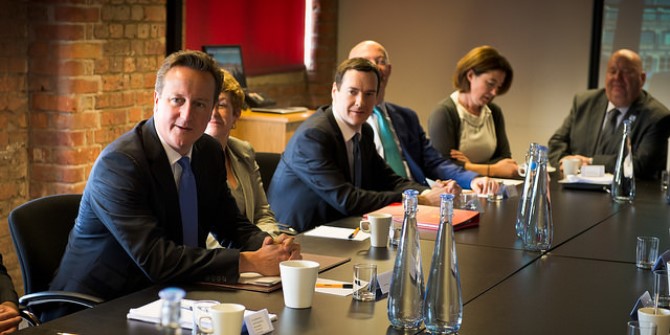 The UK has seemingly delivered on a difficult task: providing a growth strategy in the midst of austerity. Linda Yueh argues that despite the lack of fiscal room in the case of another crisis, the UK did what it could: strive for a neutral budget, thereby preserving the UK’s AAA rating.
The UK has seemingly delivered on a difficult task: providing a growth strategy in the midst of austerity. Linda Yueh argues that despite the lack of fiscal room in the case of another crisis, the UK did what it could: strive for a neutral budget, thereby preserving the UK’s AAA rating.
It is not an easy combination to deliver: growth in a fiscally neutral budget. If the famous red box of the Budget is viewed as the container, then it did not and could not get larger because the UK is projected to have the second highest budget deficit in the EU this year. However, what was inside the container got shuffled around and it seems to have worked to boost confidence at least.
First, the economic growth and deficit forecasts were largely unchanged: 2012 GDP growth was revised up to 0.8% from 0.7%, but next year’s growth was revised down by the same amount from 2.1% to 2%. The budget deficit estimate was largely met for 2012-13 at 8.3% of GDP and next year’s target remains at 7.6%. Compared with the Euro Zone, where countries like Spain pledged to bring their deficits down to below 3% of GDP by 2013, the UK has much more breathing space. Even the debt load is projected to peak at 76.3% of GDP in 2014-15 instead of 78%, although the Chancellor made it clear that it’s due to a windfall from the taking on of Royal Mail’s pension fund (and they’ll need to pay for it later).
So, within these confines, the government basically reorganised what it spends to place more emphasis on encouraging businesses to invest. Cutting the corporation tax to 24% next month and to 22% by 2014-15 was a centrepiece. But, the Chancellor made it clear that banks won’t benefit as the bank levy was raised to 0.105%. The other eye-catching move was a cut in the top rate of tax from 50p to 45p next April. But, as it was a fiscally neutral budget, it was matched by a new stamp duty of 7% on homes worth over £2 million. In economists’ parlance, it’s a shift of tax from wages that could disincentivise work to a tax on assets that have less of an effect. Also, the Independent Office for Budget Responsibility found that the top 50p tax raised only £1bn instead of the expected £3bn since high earners could evade the measure.
This was the biggest area of criticism levied by the opposition Labour Party who thought that the priorities were wrong. They felt any additional revenue should have been spent on the “squeezed middle” or the unemployed despite the Chancellor’s increase in the personal allowance or the amount of tax-free income to £9,205 from next April, which is close to the £10,000 advocated for by the coalition’s junior partner, the Liberal Democrats. It is in that sense a budget for business as billed, which is a choice that will surely provide fodder for Labour in the General Election.
The most that could have been expected from this Budget was setting out a growth strategy that could encourage businesses to invest. Of the macro drivers of growth, this is more promising than relying on consumers who are still deleveraging, exporting to a global economy where the euro zone is expected to be in recession. It is also a more promising strategy in light of the weak recovery in the US, and at a time when government spending is not very feasible.
There are problems, however: the government doesn’t have fiscal room to respond to a shock from the Euro Zone or other economic crises. It hasn’t even figured into growth forecasts.
Although, for the moment, the UK has seemingly delivered on a difficult task: providing a growth strategy in the midst of austerity. An instant reward of sorts is the verdict of Fitch which views the Budget as neutral in terms of the UK keeping its cherished top AAA credit rating, saying,“The 2012 budget does not impact Fitch’s assessment that the UK’s ‘AAA’ sovereign rating is warranted but is vulnerable to adverse shocks.”
For now, that may be the best that the UK could aim for
Please read our comments policy before posting.
Note: This article gives the views of the author, and not the position of the British Politics and Policy blog, nor of the London School of Economics.
Linda Yueh is an economist, broadcaster and author. A Fellow in Economics at Oxford University and Adjunct Professor of Economics at the London Business School, she is Economics Editor for Bloomberg TV. Dr. Yueh directs the China Growth Centre (CGC) at St. Edmund Hall, University of Oxford, is an associate of the Globalisation programme at the Centre for Economic Performance (CEP) and IDEAS at the LSE.








1 Comments